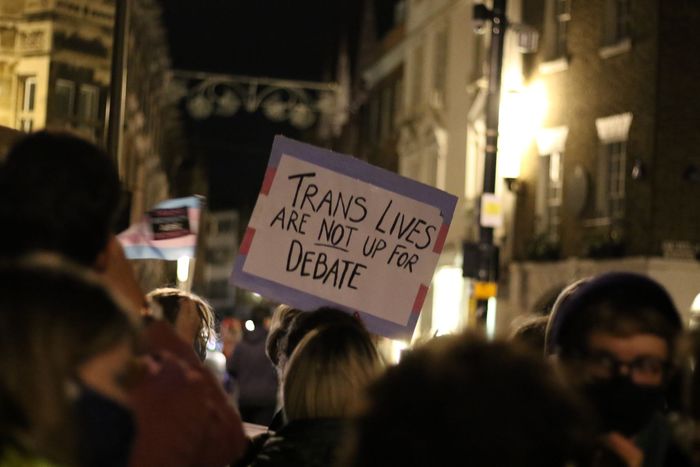Leader: Helen Joyce has a right to speak, and students have the right to protest it
It is better to protest speakers we dislike than try get them cancelled

This Tuesday, students would have found it hard to miss the talk by Helen Joyce hosted at Gonville & Caius. They might have been overwhelmed by the huge volume of online activity, especially on Twitter, telling Cambridge students what we should or shouldn’t think. Many would also have seen it advertised on faculty mailing lists, which represents an unacceptable overreach by the organisers of the event – Professor Arif Ahmed especially.
Professor Ahmed has a track record of courting controversy, having re-invited Jordan Peterson last year for a talk a year after the Divinity faculty rescinded a two-month visiting fellowship offer, when photos emerged of him posing next to a man wearing an Islamophobic shirt. Ahmed declared the event a “victory”, again criticising the University’s previous disinvitation. Whether you love or despise Peterson and what he stands for, the intense battle of free speech instigated the rescinded fellowship gave him publicity on a platter, and allowed him to be victimised despite his views.
The invitation of Helen Joyce is Ahmed’s latest and most overt attempt to start a free speech war, and one that Ahmed no doubt will have relished. But we do not have to combat hate on Ahmed’s terms: instead of no-platforming speakers, which lends undeserved credibility to a narrative of censorship and victimhood, students can and should exercise their right to protest. It is this outpouring of student expression that represents the best of Cambridge.
And lively protests were organised outside Caius by the Student Union, their chants echoing down King’s Parade. The right to protest is as crucial a part of free speech as hosting talks, and those brave enough to rally in support of trans rights deserve to be heard. In a world hostile to both young people and marginalised communities, it is more important than ever that allies embolden them with shows of strength and solidarity. Protests can allow this to happen in a meaningful, public manner.
Those who criticise the protests are fundamentally unserious in their inconsistency, and do not speak for Cambridge students as a whole. Self-proclaimed free speech defenders are therefore sorely mistaken to see this protest as a threat to free speech. Instead, it is representative of a thriving, politically engaged, expressive student body confident enough to argue for their rights in the open, rather than fall into the trap of no-platforming.
Of course, there are students who agree with Joyce’s rejection of gender identity and believe that sex is immutable and binary. Those students obviously have the right to invite her and attend her talk. Others also have the right to protest, and loudly at that.
But perhaps valuable lessons were also learnt in the event itself. Joyce posted on Twitter after the event, expressing her gratitude for having had the chance, for the first time in years, to be confronted by people who disagree with her or despise her in such an intimate setting. In the same way, students who attended the talk left with an enriched understanding of the subject and their views of it, by virtue of thorough debate. As controversial as this talk was, the ability to debate and discuss freely is at the heart of what makes this University such an enlivening place to study. This right must be vigorously defended, not diluted.
 News / Pembroke to convert listed office building into accom9 December 2025
News / Pembroke to convert listed office building into accom9 December 2025 News / Gov declares £31m bus investment for Cambridge8 December 2025
News / Gov declares £31m bus investment for Cambridge8 December 2025 Features / Searching for community in queer Cambridge10 December 2025
Features / Searching for community in queer Cambridge10 December 2025 News / Uni redundancy consultation ‘falls short of legal duties’, unions say6 December 2025
News / Uni redundancy consultation ‘falls short of legal duties’, unions say6 December 2025 Lifestyle / Into the groove, out of the club9 December 2025
Lifestyle / Into the groove, out of the club9 December 2025










